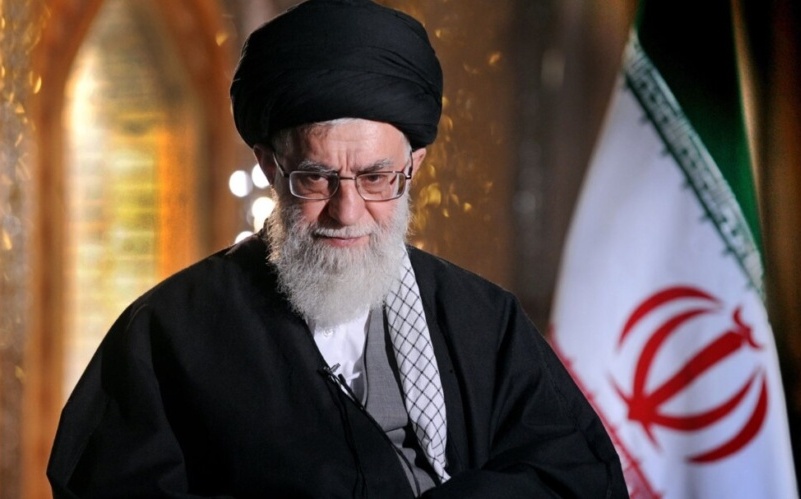Has Iran’s Supreme Leader authorized direct talks with the US over Tehran’s nuclear program?
The US State Department has said Iran must take “de-escalatory” steps over uranium enrichment if it wants to resume talks for a resolution of the Iranian nuclear program and American sanctions.
Spokesman Matt Miller said on Tuesday that Tehran must start by cooperating with the International Atomic Energy Agency, including over inspections of Iranian nuclear facilities.
Miller’s comments followed a report in Amwaj Media, based on “multiple informed senior sources”, that the Supreme Leader has reversed his position and given permission for direct talks with Washington.
The sources said Iran’s nuclear negotiator, Deputy Foreign Minister Ali Baqeri Kani, is ready to meet with the Biden Administration’s coordinator for the Middle East and North Africa, Brett McGurk, in Oman in coming weeks.
But Tehran has complicated that possibility by stepping up its restrictions on IAEA monitoring of the nuclear program. It has barred 1/3 of inspectors. It is continuing its refusal from early 2022 to hand over video surveillance footage, or to reinstall cameras that it has removed from facilities.
IAEA head Rafael Grossi condemned the ban on the inspectors as a “disproportionate and unprecedented unilateral measure which affects the normal planning and conduct of agency verification activities”.
See also Iran’s “Unprecedented” Barring of Nuclear Inspectors
Speaking to reporters last Friday, US Secretary of State Antony Blinken linked the stalled nuclear talks and Iran’s restrictions on the IAEA.
We tried to work indirectly with Iran as well as with European partners and even Russia and China to see if we can get a return to compliance with the Iran nuclear deal….But Iran couldn’t or wouldn’t do that
Just this past week we saw them remove IAEA inspectors who are critical to doing the work at the IAEA to — as best you can — ensure that Iran is consistent with whatever obligations it has. That is not evidence of an Iran that is interested in actually being a responsible actor.
The “informed sources” in Tehran did not give a specific motive for the Supreme Leader’s shift over talks with the US.
However, Tehran is facing a critical moment in October, when the limits in the 2015 deal over its nuclear and missile programs — mandated by a UN resolution — are set to expire. The UK, France, and Germany have all said that they will maintain the limits and thus sanctions if Iran breaks them.
While obtaining some relief with $6 billion in unfrozen assets in return for the release of five American-Iranian political prisoners this month, the Iranian leadership is still under economic pressure from a weak currency, an official rate of inflation at about 40%, and the ongoing US sanctions.
“We Are Open to Diplomacy With Iran”
Since the Trump Administration left the nuclear deal in 2018, Iran has broken its provisions with the enrichment of 20% and then 60% uranium. The latter can potentially be further enhanced to a military grade of more than 90%.
Over the summer, Iran continued to add to the 60% stock, although it decreased the rate of increase in what some analysts saw as a possible sign of goodwill.
On Wednesday, a US official said there are no direct or indirect talks scheduled, including any involving Brett McGurk.
The Iranian Foreign Ministry dismissed the Amwaj report: “This type of news sensationalism and media games, which is often used to create a political atmosphere, lacks credibility.”
However, State Department spokesperson Miller kept the door open to discussions if Iran pulled back from its current position over enrichment and the IAEA.
We have always said that we are open to diplomacy with Iran. I don’t want to get into what any such talks might or might not look like, but diplomacy, we believe, is the best path to preventing Iran from obtaining a nuclear weapon.


Saudi Arabia, Qatar, Iran say Israel has only itself to blame for Hamas attacks
https://thehill.com/policy/international/4243388-saudi-arabia-qatar-iran-blame-israel-hamas-attacks/
Iran net oil export revenue hit $54 bn in 2022: https://en.mehrnews.com/news/202649/Iran-net-oil-export-revenue-hit-54-bn-in-2022#:~:text=TEHRAN%2C%20Jul.,oil%20export%20revenue%20last%20year.
This is a huge amount for a country whose oil exports are sanctioned and shows the ineffectiveness of Washington to curb such trade. Iranian oil is considered to be of high quality and consistency. Iran can also reliably supply it unlike some countries subject to production disruptions.
[Editor’s Note: This series of articles, in Semafor and the Saudi-funded Iran International, has been flagged as suspect by analysts of Iran and the US. An apparent “hit piece” on fellow analysts such as Ali Vaez and Ariane Tabatabai, suspicion has fallen on hardliners in Iran — as well as Saudi Arabia, who may wish to derail any thaw in US-Iran relations — for leaking and possibly altering documents.]
https://www.semafor.com/article/09/28/2023/pentagon-probe-iran-report
“The Pentagon has launched an investigation into a top-secret security clearance approved for a U.S. defense official who took part in an Iranian government-backed initiative, beginning a decade ago, which sought to promote Tehran’s positions on national security issues in the U.S. and other Western countries.”
Iranian Security Forces Fire At Zahedan Protesters; At Least 19 Wounded
https://iranwire.com/en/news/121025-iranian-security-forces-fire-at-zahedan-protesters-at-least-19-wounded/
Anniversary: Iran’s Zahedan under Heightened Security Measures
https://iranwire.com/en/news/120984-bloody-friday-anniversary-irans-zahedan-under-heightened-security-measures/